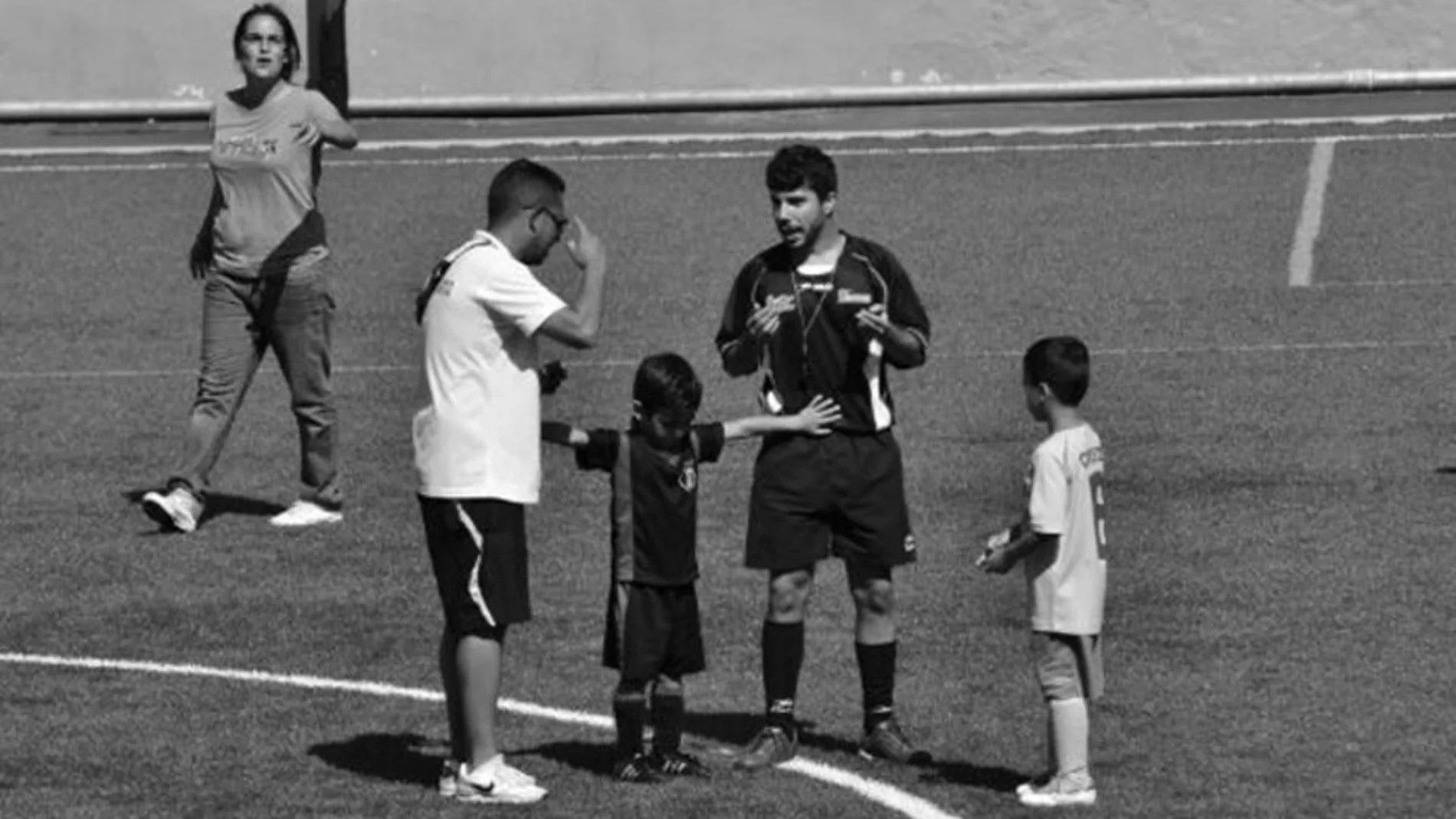European research shows the violence suffered by minors in sport
- Montse Martín is a professor of a sports career at the University of Vic of Catalonia. Organized by the University of the Basque Country, he has offered a talk in Donostia-San Sebastián on April 6. Research is being carried out at European level, in cooperation with universities and sports agents from five other European countries. This is the title of the research: Prevalence and characteristics of different violence against minors in sport. The results of this study were published. Among other things, the fact that the interviewees have suffered less violence in sport than outside sport, that psychological violence is the one endured by the majority of athletes and that as the level of sport increases, more violence is experienced.

The European project CASES has analyzed the prevalence and characteristics of child violence in the firol in the following six states: United Kingdom, Germany, Belgium, Austria, Spain and Romania. The survey was carried out on 10,306 people, all aged between 18 and 30, who had to answer their previous experiences when they were minors. Of these, 50% are women, 49% are men, 1% are not defined. 82% heterosexual, 11% bisexual, 4.5% homosexual, 1% lesbian, 1% other options and 2% not expressed. 4% belong to a reduced ethnic group. 3% said they had a physical disability and 19% of them had only practised adapted sport.
After-school sports activities have been considered as areas: both clubs and schools with sports equipment... so those that have occurred during gymnastic hours or school rest have not been analyzed.
The professor of the Catalan University of Montse Martí has presented the preliminary results in Donostia-San Sebastián. In this video, you can see the whole talk.
Standardized violence
82% of respondents rated their sport experience as “good” (41%) or “very good” (41%). 5% said their experience was “bad” (4%) or “very bad” (0.7%). 14% have described it as "neutral". Montse Martín values these results as follows: “These are very good results for sport, but it may also indicate that violence between people is very normalised in sport. Because, as we will see below, the data on violence is also very high. How is it understood that the experience is well valued despite the violence? Because those people don’t see these situations of violence as serious, ‘this is sport, I knew that before we started doing sport there was going to be this’ it’s common to listen.”
The figures for the five violations
Psychological violence is the most common in sport (65% of respondents have suffered it). Then comes physical violence, and the number of sexual negligence and violence is not ridiculous. The figures for each type of violence are as follows:
Psychological violence: The European average is 65%. Belgium is the least populated region of Flanders (59%) and Germany has the most (70%).
Physical violence: The European average is 44%. Austria was the least (32%), followed by Belgium, Brussels-Wallonia (52%).
Negligence: In Europe, the average is 37%. In Austria, 32% of the interviewees and in Germany, 42%, were the most affected.
Non-contact sexual violence (pulling sexy gaze, for example, commenting on the body of one or the other): In Europe, the average is 35%. The UK is the country with the least (30%) and Belgium – Brussels-Wallonia the most (41%).
Sexual violence with contact: In Europe, the average is 20%. In Austria, 15% of the interviewees and in Germany, 25%, are the most affected.
This article details the concrete situations and amounts behind each of these forms of violence.
Less violent than social sports
Asked about the violence suffered both in the sports and non-sports fields, the athletes who have responded in the Spanish state say that there is more violence they have had to suffer outside the sport. But this is not the case for the two forms of violence: physical violence and neglect are the ones that have suffered the most in sport than in other areas. In the graph, in what number have each type of violence suffered, in sport and outside sport:
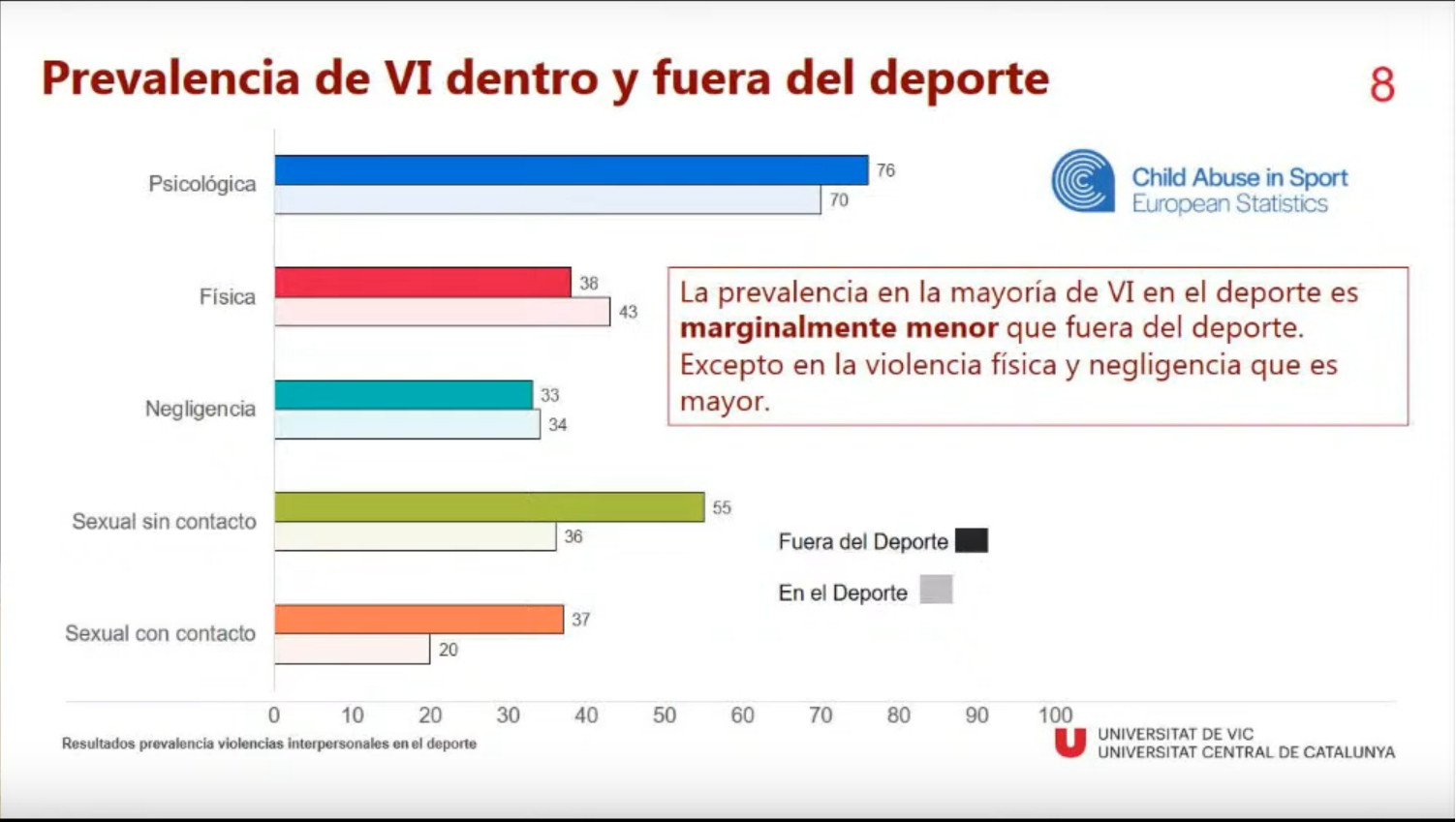
Psychological violence: 76% out of sport and 70% out of sport.
Physical violence: 36% outside sport and 43% in sport.
Negligence: 33% out of sport and 34% in sport.
Non-contact sexual violence: 55% out of sport and 36% out of sport.
Sexual violence with contact: 37% out of sport and 20% out of sport.
These data have been evaluated by Montse Martí as follows: “The numbers of violence within and outside sport are not far away. This shows that sport is part of society. But the fact that there is more physical violence in sport has given us reason to think that physical violence is poorly seen in society, while in sport it may not be so poorly seen. Part of the structural violence of sport is to think that the tough physical demands will make the athlete better, ‘the more physically squeezed, the better’. But where's the limit? When does what is supposed to be training violence happen? We have to start investigating these ambiguities.” Martí explained that it is common for sports training to impose physical punishments, "for example, that a young man who does not listen is punished for taking ten turns in the field".
As the sports level increases, more violence
The analysis of data from the Spanish State shows that the higher the level of sport, the higher the violence suffered. Montse Martín explains that: “At the international level there is much more intensity, more hours of work, more contacts, more competitions... and all of these violence occur in a much more structural way, because the people who run in the high-level competition have much more power to do those violence and it seems that nothing happens. Therefore, prevention and awareness-raising should also be carried out in the field of high-level sport.”
The graph shows the data:
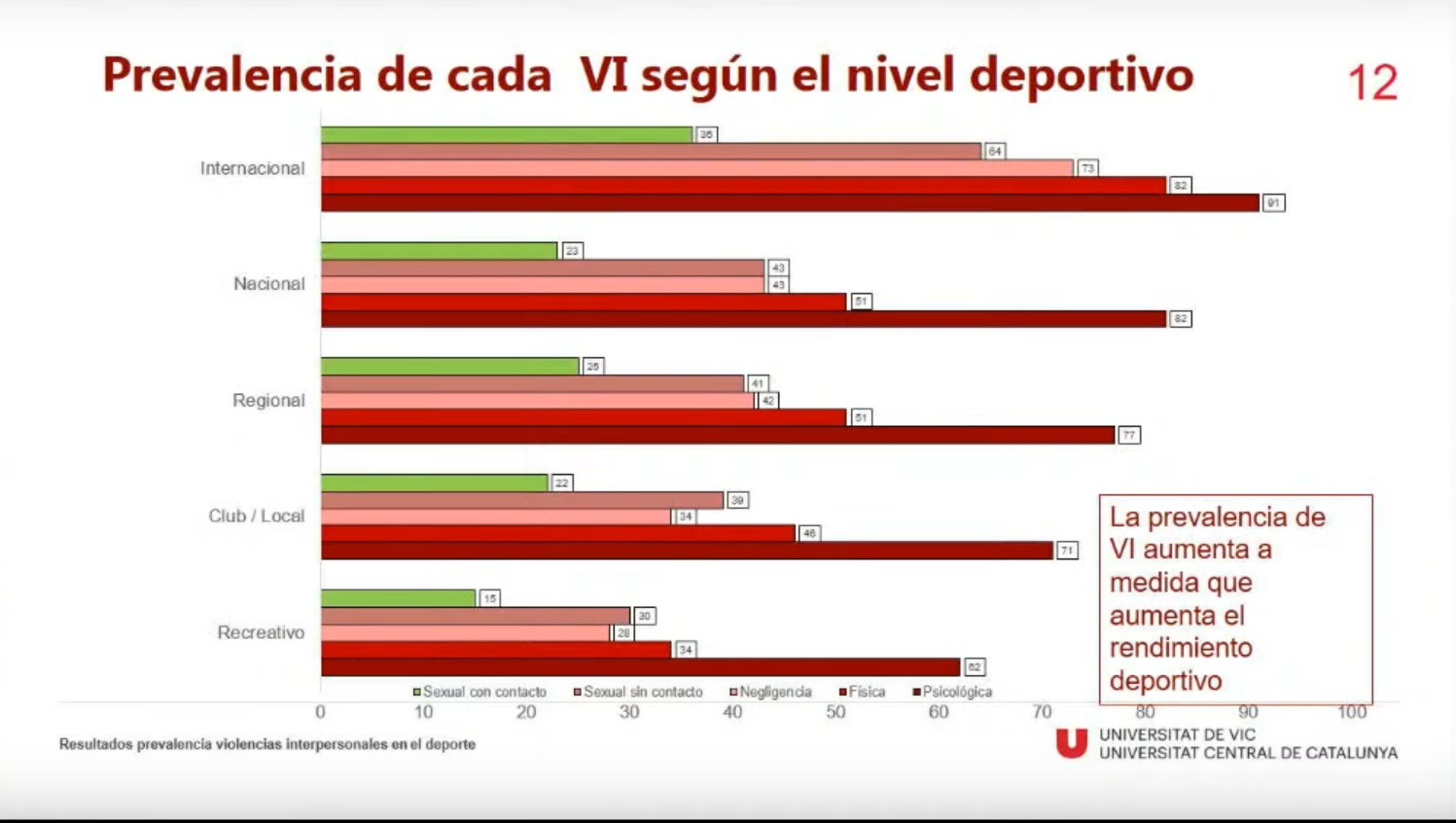
Psychological violence: Regarding leisure groups, 62%, the local club 71%, the territorial club 77%, the state club 82% and the international club 91%.
Physical violence: Regarding pastime groups, 34%, the local club 46%, the provincial club 51%, the state club 51% and the international club 82%.
Negligence: Regarding pastime groups, 29%, the local club 34%, at the territorial level 42%, at the state level 43% and at the international level 73%.
Non-contact sexual violence: Regarding pastime groups, 30%, the local club 39%, at the territorial level 41%, at the state level 43% and at the international level 64%.
Sexual violence with contact: Regarding pastime groups, 15%, the local club 22%, the national territory 25%, the state 23% and the international 36%.
This study reveals that girls suffer less violence in sport than boys. This article explains the scope of this unexpected data.
But how does the aggressor achieve sexual violence and silence minors in the sports field? In this article we collect the explanations of Montse Martí.
The four conclusions
Montse Martí highlights four conclusions of this European study:
1.-Perhaps sport does not offer the "protective environment" that is attributed to it. Martí says that the benevolent discourse that links sport with the highest values of people must be banished and the blindfold removed: “The sport is very combative, wonderful, but it is not the protective environment that is assigned to it.”
2.- Scientific, independent and sound research is required. The more research, the more information, the more things that can be done to further reduce violence.
3.-The treatment of violence in sport implies a cultural change. “It requires technicians, sports organizations, clubs, all those involved in school sport… a proactive leadership that drives the issue even when there are no frightening or hot issues in society.”
4.-"We must implement policies and actions, and we must stop doing what we do not see in situations of violence. They must be detected early in order to deal effectively with them. The sooner violence against minors is combated, the less negative effects it will have."
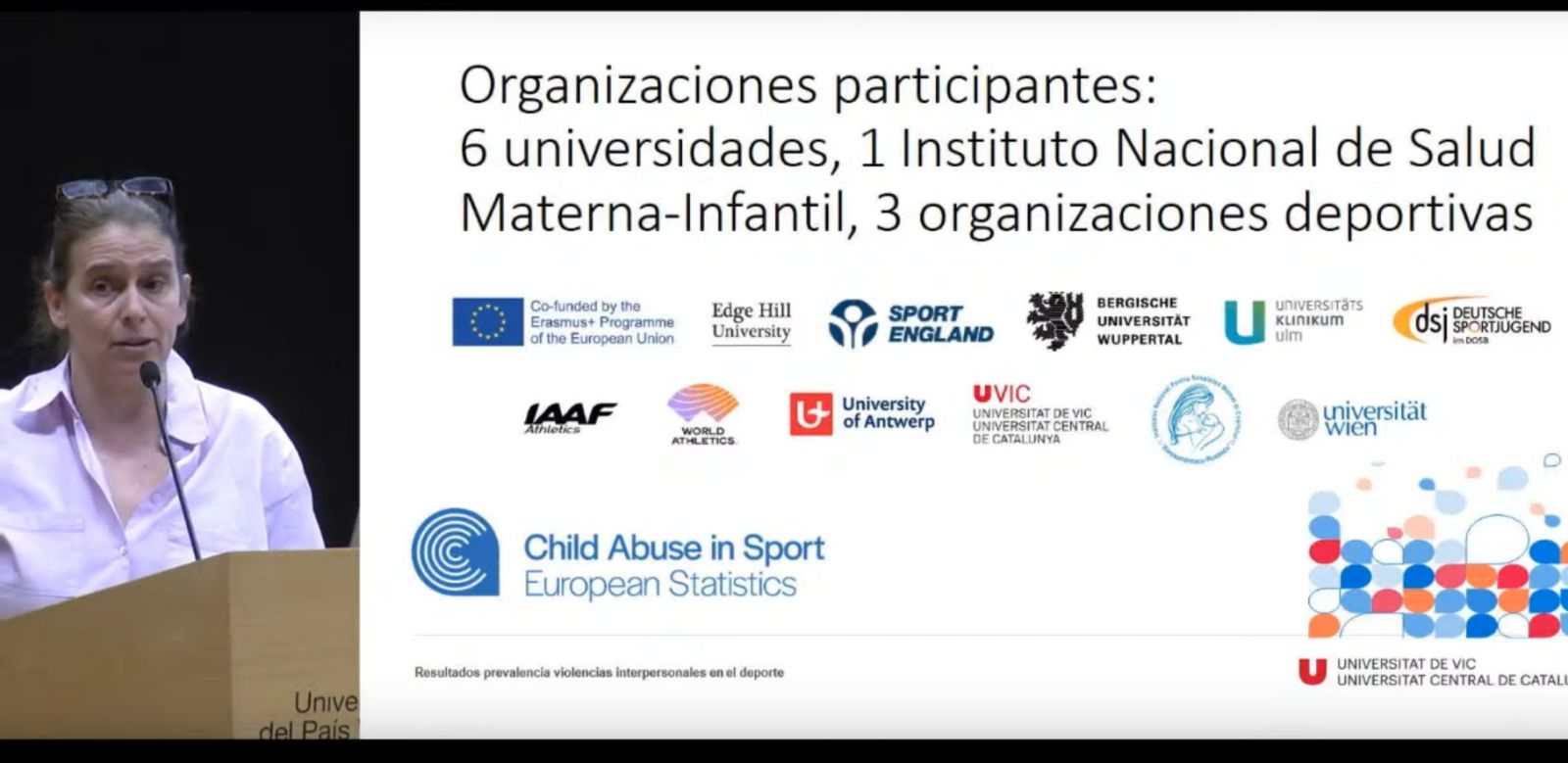
The CASES project (Child Abuse in Sport, European Statistics) involves universities and sports organisations from six European countries: United Kingdom, Germany, Belgium, Austria, Spain and Romania. Montse Martín explains that this is the first prevalence research carried out in the Spanish state and called for the removal of the lid that is usually placed in the eyes to look with kindness to the athlete: "We have to do prevalence studies, otherwise we don't know how many cases they are, we don't know the reality, we won't avoid these violence and we won't be able to evaluate the information awareness work that is done."
Gizonak ustez Ortuellako Jendea futbol taldean zuen posizioa baliatu zuen umeari argazkiak egiteko. Ertzaintzak ikerketa abiatu du eta aurretik antzerako salaketak zituela jaso dute.
Ten men have been tried at the Provincial Court of Álava from September 26 to October 3 for sexual abuse of minors cared for in the Sansoheta center of the Provincial Council of Álava. Victims have waited six years after the complaint in 2016. According to a study by the... [+]








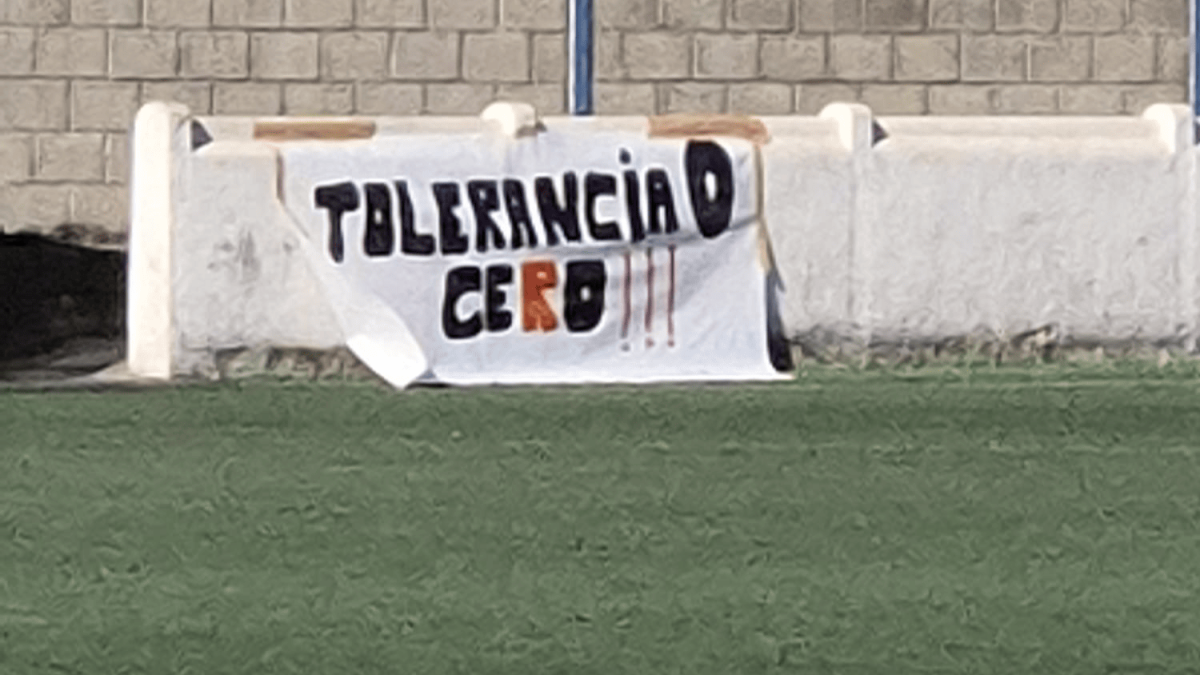
.jpeg)





